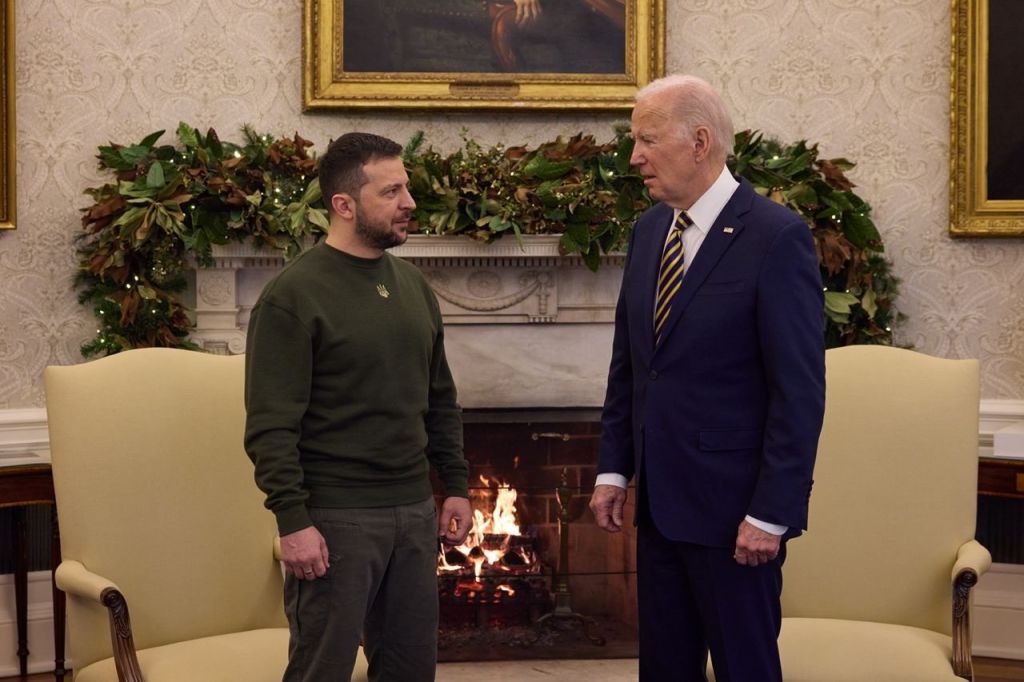Where do you stand on the momentous question of Volodymyr Zelensky’s attire?
I’m okay with it. Eschewing a suit and tie for what might be described as “wartime casual” when visiting the White House is unorthodox, admittedly. But it’s something of a tradition for foreign leaders trying to rally the free world against fascists bent on conquest.
I didn’t expect to be writing about men’s apparel today. But this is, after all, a newsletter about populism, and American populists are having a collective aneurysm over the fact that Zelensky wore a green sweatshirt and slacks during his visit to Washington.
“This ungrateful piece of sh*t does not have the decency to wear a suit to the White House — no respect [for] the country that is funding his survival,” an indignant Benny Johnson tweeted. “Track suit wearing eastern european con-man mafia.” Numerous other populists agreed, with Charlie Kirk scoffing at Zelensky’s “costume.” Rep. Matt Gaetz (R-MAGA) attended Zelensky’s speech to Congress, albeit not enthusiastically, and was asked afterward if there was anything he liked about it. “I loved the fashion choices,” he sneered.
Tucker Carlson complained that Zelensky looked like the “manager of a strip club” and wondered why he wasn’t thrown out of Congress before accusing the Ukrainian president of having “declared war against Christianity.” In this case, “Christianity” refers to the Ukrainian affiliate of the Russian Orthodox Church, an outfit led by a bloodthirsty Putin crony and co-opted by the Kremlin to burnish Putin’s image as defender of the Christian West. Kyiv fears that the local branch of the ROC is pushing imperialist propaganda on Ukrainians, evidently with some reason, which to Carlson amounts to an issue with the Christian faith writ large. In reality, Ukrainians are more religious on average than Russians are. And of the two combatants in this conflict, it wasn’t Ukraine’s leader who decided that “Christianity” requires him to bomb population centers in a neighboring state to rubble.
But go figure that the sort of spin favored by the Kremlin about Ukraine’s Jewish president would end up in primetime on Fox News.
Anyway, the interest in Zelensky’s garb is curious, particularly since it’s plain as day that he would have been attacked by this same crowd of chuds if he had dressed finely for the occasion. Populists would have demanded to know how much of their hard-earned taxpayer money had gone toward buying natty new duds for “this grifting leech,” in Matt Walsh’s words, or for Zelensky’s better half. “We want nothing to do with you,” Candace Owens tweeted at Zelensky. “Stop stealing from our people while your wife drops tens of thousands of dollars shopping in Paris.” The claim that Mrs. Zelensky is living high on the hog in Paris is an inch thin, it turns out, but no matter. Owens also fantasized about “punching” the Ukrainian leader.
“What the hell is wrong with these people?” you might ask. It’s a good question. Theories abound.
I offered my own summa on what makes modern right-wing populists the way they are in my first newsletter, but Cathy Young has a concise dissection of motivations with respect to Ukraine in a post today at The Bulwark.
The question of why the Trumpian populist right is so consumed with hatred for Ukraine—a hatred that clearly goes beyond concerns about U.S. spending, a very small portion of our military budget, or about the nonexistent involvement of American troops—doesn’t have a simple answer. Partly, it’s simply partisanship: If the libs are for it, we’re against it, and the more offensively the better. (And if the pre-Trump Republican establishment is also for it, then we’re even more against it.) Partly, it’s the belief that Ukrainian democracy is a Biden/Obama/Hillary Clinton/”Deep State” project, all the more suspect because it’s related to Trump’s first impeachment. Partly, it’s the “national conservative” distaste for liberalism—not only in its American progressive iteration, but in the more fundamental sense that includes conservatives like Ronald Reagan and Margaret Thatcher: the outlook based on individual freedom and personal autonomy, equality before the law, limited government, and an international order rooted in those values. Many NatCons are far more sympathetic to Russia’s crusade against secular liberalism than to Ukraine’s desire for integration into liberal, secular Europe.
Don’t underestimate simple peer pressure as a factor. For example, the bizarre, disproportionate anger displayed by Benny Johnson toward Zelensky’s attire reeks of someone who’s less concerned with the White House dress code than with impressing other members of his political “tribe” with the sheer contempt he can muster for Ukraine’s president. Populists have made a joke out of liberals’ tendency on social media to embrace one cause du jour en masse before abandoning it en masse for another in short order, a faddishness they refer to dismissively as “the current thing.” But “the current thing” works both ways. As much as championing Ukraine is “the current thing” for Democrats and traditional conservatives, outspoken hatred of Zelensky is “the current thing” for right-wing populists.
And not the only “current thing.” My colleague David French has noticed that disdain for Ukraine tends to come packaged with skepticism of vaccines and credulity toward Trump’s “rigged election” claims. Not always, of course: There are principled isolationists on the American right who get itchy whenever the U.S. involves itself in a far-flung war, even if involvement in this case means material support rather than military intervention. That sort of person can comfortably oppose U.S. aid to Kyiv while scoffing at anti-vaxxers and election deniers.
But that sort of person was also unlikely to be performatively angry yesterday at Zelensky or his fashion choices. It takes a culture warrior, not a true-blue isolationist, to look at a man leading his country in a fight for survival and sputter, “JACKET AND TIE.”
There’s a second important difference between honest isolationists and populist ride-alongs. Both groups make the same substantive case against funding Ukraine—that it’s a bad idea to get jungled up with developing nations known for rampant corruption and that Uncle Sam’s largesse is better directed elsewhere. (“We should be sending HIMARS to working-class families in Youngstown, not the Donbas!”) The difference is that if you ended U.S. aid to Ukraine tomorrow, it’s easy to imagine principled isolationists—well, some principled isolationists—hoping that the Ukrainians prevail in their fight regardless. They’re not anti-Ukraine. They’re anti-intervention.
The populists, though? Read back through some of the comments I flagged at the start of this column or in yesterday’s newsletter. They don’t sound anti-intervention. They sound anti-Ukraine, and certainly anti-Zelensky.
You can tell a lot about someone’s priorities by what makes them angriest. That’s a big part of the tension between Never Trumpers and Anti-Anti-Trumpers, in fact. Superficially, both groups share the same priorities—they prefer conservative policies to liberal ones and believe that America can do better than Donald Trump. But Never Trumpers get angriest at MAGA Republicans, leading the Anti-Antis to question their commitment to the broader right. And Anti-Antis get angriest at Democrats, leading Never Trumpers to question their commitment to moving past Trumpism.
When I watch populists angrily sneering at Zelensky, not at Putin, I think of clips like this.
I think of the video I watched this morning at the New York Times recounting in gory detail how a Russian paratrooper unit slaughtered dozens of Ukrainian civilians in a single town back in March. I think of Anne Applebaum’s piece describing what Ukraine would look like today if Russia’s battle plan had gone off without a hitch, undisturbed by Western intervention.
Had all of that happened as planned, Ukraine would now be pockmarked with the concentration camps, torture chambers, and makeshift prisons that have been discovered in Bucha, Izyum, Kherson, and all the other territories temporarily occupied by Russia and liberated by the Ukrainian army. A generation of Ukrainian writers, artists, politicians, journalists, and civic leaders would already be buried in mass graves. Ukrainian books would have been removed from schools and libraries. The Ukrainian language would have been suppressed in all public spaces. Hundreds of thousands more Ukrainian children would have been kidnapped and transported to Russia or trafficked farther around the world.
None of that in itself justifies pouring endless billions into Kyiv. There are many humanitarian disasters which Washington doesn’t intervene to prevent, after all. (Ask a Uyghur, they’ll tell you.) But if you evince more rage at Zelensky and his fashion choices than you do at, say, this …
… then yeah, your priorities are in question.
That’s particularly so when you compare how populists react, or don’t react, to our devil’s bargain with the savages who run Saudi Arabia. As with Ukraine, we provide billions of dollars in military assistance to the Saudis, albeit in the form of arms sales rather than aid. And as with Ukraine, we do so despite endemic corruption within the government—which, in the Saudis’ case, includes chopping up U.S. residents who dared to make trouble for Riyadh. We do this because the Saudis are an important regional counterweight to a sworn U.S. enemy. Just like … Ukraine, vis-a-vis Russia.
Populists don’t care about the Saudis, though, and it’s not because the royals there are cutting checks to pay for their weapons with the blood money they’ve amassed from oil instead of having it gifted to them à la Kyiv. It’s because the Saudis are pro-Trump, anti-Biden, and anti-Iran. They have the right friends and the right enemies. If the next Republican president wants to start giving them weapons to bomb Yemen as freebies, I promise you won’t hear much grumbling from the American Firsters.
Why do they have it in for Zelensky, then? There’s one reason everyone has overlooked.
They resent Zelensky because he made fools of them. They backed the wrong horse in this war, and they’ll never forgive him for it.
He made fools of all of us, really. Who among us expected the Ukrainian army to hang on for a month, let alone 10 months, let alone turn the tide of the war and recapture territory like Kherson that had fallen to the Russians early?
Who believed Zelensky and his cabinet would remain in Kyiv under threat of death to inspire Ukraine’s resistance instead of relocating to Lviv or bugging out Ashraf-Ghani-style with a chunk of the national treasury in their suitcases?
I didn’t. You probably didn’t either. If so, don’t feel bad: The CIA got it wrong too, somewhat predictably. Most of us have never been happier to have been so mistaken.
Most. But not all.
If you’re a post-liberal populist, particularly of the Very Online variety, watching Putin go belly up in Ukraine has dashed all sorts of political illusions. Your faith that strongmen are the best, most competent instrument for achieving political prerogatives is shaken. Your belief that woke Western militaries are no match on the battlefield for fascist machismo looks silly. Your hope of a great authoritarian victory over Ukraine that might inspire Americans to embrace nationalism and reject the global liberal order has disappeared along with 100,000 or so Russian soldiers. Even your sense of Putin as a champion of traditional Christianity has been … complicated by the Kremlin’s babbling about “desatanization” while bombing schools and hospitals.
Putin has embarrassed you in every conceivable way. Naturally, you hate Zelensky for it.
But you know what? Although most loud-and-proud MAGA populists will never admit it, they admire Zelensky. And that makes them angry too.
These people have spent seven years—seven years—feeling obliged to apologize for Donald Trump’s full-spectrum cretinism, smelling his every political fart and praising it as a rare, exotic perfume. They are, understandably, quite sick and tired of it, especially now that that cretinism is weighing them down at the polls. This week alone, while Zelensky risked his life to lobby for his country while it’s under siege, they had to weather news about Trump being referred to the Justice Department for criminal prosecution, Trump cronies admitting they never believed his election lies, and possible Trump corruption at the IRS with respect to his tax returns.
Day by day, their favorite domestic strongman and their favorite foreign strongman are finding new and exciting ways to embarrass them. Is it so surprising that having Volodymyr Zelensky, the toast of the global liberal order, show up in Washington in his combat “uniform” would feel like a personal humiliation in that context?
It’s not about the money. If anything, U.S. spending on Ukraine has been freakishly efficient. And if we cut that spending tomorrow, their opinion of Ukraine’s leader won’t change. It’s what Zelensky represents that irks them—competence, sacrifice, bravery, honor. I don’t mean to idolize him by saying that; populist concerns about corruption within the Ukrainian government are well-founded. But you don’t need to be perfect or even good to behave honorably at a decisive moment. (See also Mike Pence, another figure despised by MAGA.) Zelensky has. He could have whimpered. He could have fled. He fought.
And people whose political immune systems have been exposed to nothing but Trumpism since 2015 simply cannot handle it. Their reaction to an honorable figure at this point is almost immunological, inducing a sort of fever as they struggle to fight off an unfamiliar pathogen. That’s how they end up having a group conniption about someone not wearing a three-piece in the White House.
I encourage you to take the time to watch last night’s speech if you haven’t. It was shrewd in its lavish expressions of gratitude, invocations of America’s great battles, and insistence that the fortunes of Western nations are bound together. Congress doesn’t see many honorable moments, but this was one. All the worst people are mad about it.







Please note that we at The Dispatch hold ourselves, our work, and our commenters to a higher standard than other places on the internet. We welcome comments that foster genuine debate or discussion—including comments critical of us or our work—but responses that include ad hominem attacks on fellow Dispatch members or are intended to stoke fear and anger may be moderated.
With your membership, you only have the ability to comment on The Morning Dispatch articles. Consider upgrading to join the conversation everywhere.